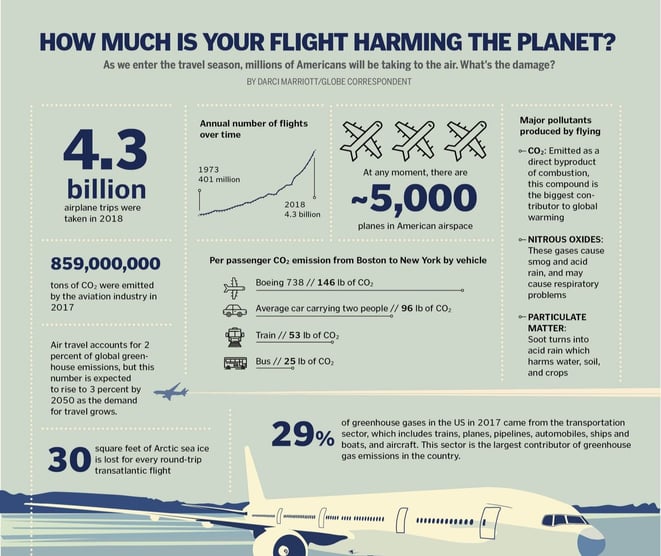Puerto Rico Will Rise, Thanks to Renewables, Microgrids and Energy Storage
Our Climate Change Perspectives mini-blog series is a 3-part series that brings to light the personal impacts of...

For a couple decades now, we've offered consumers an easy way to have their electricity usage met by renewable energy. That's simple — just plug some wind and solar into the grid. But how about air travel? Although progress is being made on electric planes (you read that right), it will be a while before you get on a jet powered by batteries. But we need to mitigate the impacts of flying because those impacts are real, huge, and growing.
Here’s an excellent graphic that was in the Boston Globe recently with some important details.
 Credit: Darci Marriott, Boston Globe. Click here to see the full graphic.
Credit: Darci Marriott, Boston Globe. Click here to see the full graphic.
For an interesting take on the ethics of air travel, read this opinion piece, "You don't have a right to cheap flights."
Now let’s dive into what the average person might find as they ponder that cross-country trip to see Grandma. The words "carbon offsets" might come to mind.
You’re going to google “offset my air travel” and probably see recommendations that you buy carbon offsets. Air travel carbon offsets typically manifest as a donation to a group that’s doing climate change related work or projects, OR as a direct purchase of the right to claim responsibility for a measurable reduction in carbon emissions created by something else, like a tree or a wind turbine. In the case of renewable energy carbon offsets, actual "additionality" (meaning that your purchase of said carbon offset played a role in the renewable energy project's viability) depends on whether or not the renewable energy project supported needs those financial contributions… or not. Why be wary?
There’s no way to go wrong in supporting renewable energy, is there?
It depends upon whether your definition of “supporting” is giving something that is needed. You may not be supporting renewable energy at all when you buy carbon offsets. And if you and everybody else out there think you are when you aren’t, then we aren’t moving the needle on climate change (again, this applies to buying green electricity too).

Unfortunately, it’s hard to know which projects need your help. The sale of carbon offsets for financial stability is entirely based on the project itself — and, to some extent, the state it is in (a similar scenario as with Renewable Energy Certificates, described in this blog). That’s why we were very thrilled when a new local company called Jet-Set Offset asked us to help them offer carbon offsets that really make a difference.
The co-founder of Jet-Set Offset, Anna Ford, approached us last spring after hearing about us from friends at the unstoppable Mothers Out Front. Anna asked us to be a “pilot partner,” and we took her up on it. We’re currently one of a few organizations people can support through Jet-Set Offset — the other local one being our long-time partners at Mass Audubon.

As the brand name states, the company is about helping flyers offset the impact of air travel. When Anna came to us, we explained that our renewable energy program allows us, using contributions from voluntary consumers, to purchase more Renewable Energy Certificates than required by state laws. Because we build upon a New England-specific system that includes the right market conditions and a robust REC tracking system, we can rightfully claim additionality and verifiability. That’s what Jet-Set Offset was looking for and what you might be looking for as well.
The airplane you ride will not be powered by the wind power, but we can measure the carbon footprint of your flight and we can displace some or all of that carbon equivalence on the grid with wind power.
Sign up at www.jetsetoffset.com, add a credit card, and choose Green Energy Consumers Alliance as your donation partner. For every mile you fly, you'll donate 1 cent to our New England Wind Fund either automatically or by manually entering your destination or forwarding your flight info.
Although 1 cent per mile may not completely offset the carbon impact of your flight, we’ll make sure the money goes to good use. For every 3,400 miles flown (by one or multiple people), 1,000 kWh of wind energy comes onto our electric grid. That’s enough to power the average home for 6 weeks.
Since mid-December, 208 donors have joined up to support our cause. All of the flights that we take as an organization are run through Jet-Set Offset. We hope you’ll join in too.
Our Climate Change Perspectives mini-blog series is a 3-part series that brings to light the personal impacts of...
As wind and solar projects proliferate and people acknowledge the benefits of renewable energy, more consumers...
Comments